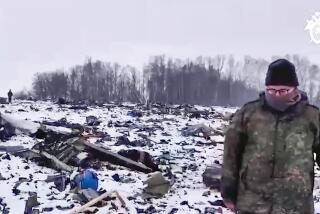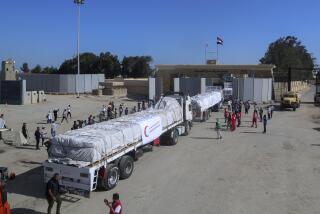Who’s Got the Courage? Aid Workers
In his Memorial Day address, celebrating the brave men and women of the armed forces, President Clinton told his fellow Americans: “Today there is a new challenge before us in Kosovo . . . [I]t is a big test of what we believe in . . . .” Yet in the contest of courage in Kosovo, the armed forces of the U.S. and other NATO countries are being upstaged from unexpected quarters: refugees and humanitarian workers.
Ethnic Albanians who flee from Serb repression often walk through minefields and venture across genuine battlegrounds in the north of Albania. They are not driven by heroism; they are simply choosing the lesser chance of death. But it is a risk deemed too high for NATO troops or even Apache helicopters. Sometimes, thankfully not too often, the refugees get hit by NATO bombs, because alliance pilots fly too high to distinguish refugees’ tractors from military convoys. Journalists covering this war are intrepid by choice. They travel to Kosovo with Serb or ethnic Albanian escort or without escort or even without any permit (defying the “non-permissive environment” in Pentagon lingo). For them, the biggest danger comes from the NATO warplanes.
This week, it is the humanitarian workers who are pushing the boundaries of courage. They are planning to air-drop food rations to starving ethnic Albanians hiding in the mountains of Kosovo. This particular initiative belongs to the International Rescue Committee, known for its gutsy projects in Bosnia: opening the Mount Igman road to besieged Sarajevo, providing the city with water and getting humanitarian aid into embattled Mostar. After it saw that aid painstakingly brought by land convoys was not reaching the target population, the rescue committee decided that air drops were the only choice. You may ask why NATO isn’t dropping air supplies to the needy, since it knows there are nearly 600,000 internally displaced people in Kosovo and since it has control of the air above Yugoslavia. Apparently the alliance has considered and rejected the option as too dangerous, according to the reports in The Times last week. So instead of being carried out by the most powerful military alliance in the world, it falls to a nongovernmental organization to hire a dozen brave pilots to fly Russian-made workhorse Antonov 26 aircraft, painted in white and orange stripes to utterly distinguish them from military craft. “The Serbs may think they are flying orange zebras, but certainly not warplanes” said the aid worker in charge of rounding up the planes.
The rescue committee has informed the powers that be in Washington, Belgrade and Brussels of its plans. The State Department was “supportive.” The Pentagon’s spokesman thought it was “not a good idea.” The Yugoslav government did not respond and NATO’s spokesman answered, “We cannot and will not guarantee them full protection.”
Just who are the flying daredevils ready to risk their lives in an action too dangerous for NATO? They are ethnic Russians from Moldova, formerly a Soviet republic. Of course they are being paid for the risks they are about to take, but still the valor of these men is admirable and their solidarity unexpected. Asked whether the pilots understand the risks involved and who the recipients of the aid are, one Russian from the team answered simply: “Albanians are people too. There is no other way to help them survive, so we’ll help them this way. They are people in need.”
He seemed to echo Friedrich Nietzsche, who said of war and bravery: “Not your pity but your courage has so far saved the unfortunate.”
More to Read
Sign up for Essential California
The most important California stories and recommendations in your inbox every morning.
You may occasionally receive promotional content from the Los Angeles Times.










